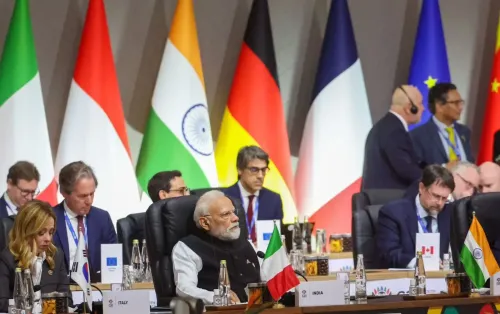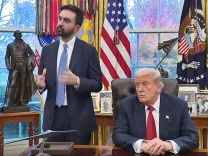Why Did Qatar Summon the Iranian Ambassador?

Synopsis
Key Takeaways
- Qatar condemned the missile strikes by the IRGC on its air base.
- The Iranian Foreign Ministry described the action as an act of self-defense.
- Diplomatic dialogue is emphasized as crucial for regional stability.
- U.S. missile defense systems intercepted the Iranian missiles, minimizing damage.
- Israel claims success in its military operations against Iranian targets.
Doha, June 24 (NationPress) Qatar has officially summoned the Iranian Ambassador to express its strong disapproval regarding the missile strikes on Al Udeid Air Base by the Iranian Revolutionary Guard Corps (IRGC) that occurred on Monday night. This action is viewed as a blatant infringement upon Qatar's sovereignty, airspace, and a violation of international law along with the United Nations Charter.
The Ministry of Foreign Affairs of Qatar reiterated to Ambassador Ali Saleh Abadi that it reserves the right to respond to this serious breach under the framework of international law.
His Excellency Sultan bin Saad Al-Muraikhi, Qatar's Minister of State for Foreign Affairs, made it clear to the Iranian Ambassador that such actions are entirely at odds with the principles of good neighbourliness and the strong ties between Qatar and the Islamic Republic of Iran. Qatar has consistently advocated for dialogue with Iran and has engaged in extensive diplomatic efforts to that end,” the Foreign Ministry's statement revealed.
Furthermore, the Minister emphasized the urgency of returning to diplomatic discussions to resolve disputes and avoid escalation, thereby promoting both regional and international stability.
In response to Qatar's summons, the Iranian Foreign Ministry described the strikes on the U.S. military base as an act of self-defense, asserting that it was unrelated to its friendly relations with Qatar, and reaffirmed its commitment to good neighbourliness.
Reportedly, Iran launched six missiles targeting American military installations in Iraq and Qatar, intensifying the ongoing regional conflict.
Despite the operation, dubbed “Annunciation of Victory”, media sources indicated that the missile strikes had minimal impact on U.S. bases in Qatar, as American Patriot missile defense systems effectively intercepted the projectiles.
According to Esmail Baghaei, spokesperson for the Iranian Foreign Ministry, this military action was a response to what he termed U.S. and Israeli “criminal aggressions” and would not disrupt the deep-rooted relationships in the region.
“The military actions against the American base 'Al-Udeid' were a legitimate exercise of self-defense under Article 51 of the UN Charter against unprovoked aggression that occurred on June 22, 2025. This act of self-defense is unrelated to our amicable ties with Qatar, with which we maintain strong and enduring relationships,” Baghaei conveyed on X.
During this period, Israeli Prime Minister Benjamin Netanyahu reported that the Israeli Defense Forces have successfully met the objectives of Operation Rising Lion and expressed support for a bilateral ceasefire proposed by U.S. President Donald Trump.
“Israel has effectively neutralized a dual existential threat concerning nuclear capabilities and ballistic missiles. The IDF has also attained complete air superiority over Tehran, delivering significant blows to military leadership and dismantling numerous key targets of Iran’s regime,” Netanyahu’s office stated.
Furthermore, Israeli operations have targeted regime strongholds in Tehran, reportedly eliminating hundreds of militants and a senior nuclear scientist. Netanyahu expressed gratitude towards President Trump and the U.S. for their defensive support in mitigating the Iranian nuclear threat.









